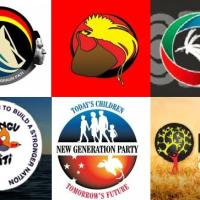On the Frontlines of Climate Change
Last month I wrote an article about the Carbon-Credit Trade in PNG because I felt that the PNG Government was fast-tracking our involvement with the global carbon-trading scheme being facilitated by the World Bank at the expense of much needed comprehensive consultation with PNG landowners.
It was then that Solo, a regular commentator in the PNG Blogosphere, directed me to On the Frontlines of Climate Change, a forum for indigenous peoples, small islands, and vulnerable communities to share ideas and thoughts about climate change and its effects on local communities.
The issue of climate change in PNG has been a hot topic in the PNG media as accusations have been thrown back and forth between Ministers, the Office of Climate Change and Environment Sustainability (OCCES), the Departments and persons involved in the formation of relevant policy and there have even been examples of propaganda spread by interest groups such as Rimbunan Hijau.
Frontlines asked my permission to use a piece of my article to republish on their website to encourage discussion of the topic REDD. Here is their article:
The impacts of REDD will be more negative than positive, says Jebra Ram Muchahary of the Indian Confederation of Indigenous and Tribal Peoples – ICITP (India, Asia). He comments that REDD will generate and increase conflicts between forest officials and government and indigenous and tribal peoples over the authority and rights of possession of forests, since the incentives process will motivate parties to compete for control over forests and forest lands. Forests will turn out to be money-centric rather than enviro-centric and hence REDD will accelerate the destruction of forests. In particular, older trees and natural forest will disappear causing a serious threat to forest ecosystems, principally in third world countries. Spiritual aspects and the sacred relationship between indigenous and tribal peoples and the forest will suffer and their symbiotic relationship will gradually be eroded causing threats to forests and the livelihoods of indigenous peoples. REDD does not provide sustainable social or environmental safeguard policies. Rather it will promote the commercialisation of the forest and hence will adversely affect the conservation of biodiversity and wildlife.
REDD is a topic that is confusing many of our people, says Tavurvur of Papua New Guinea (PNG, Pacific). The government is not following the right avenues to educate and implement REDD processes in our country. It was not at all surprising to me to discover that the PNG Government’s Readiness Plan Idea Note (R-PIN), a submission for REDD funding to the World Bank’s Forest Carbon Partnership Facility (FCPF), had been written without consulting PNG landowners, even though they own 97% of PNG’s rainforests. Despite this, PNG’s proposal has already been approved by the World Bank, thus undermining the Bank’s claim that all plans for the FCPF would be subject to wide consultation. PNG is not the only country that has fast-tracked the application of its R-PIN at the expense of NGO and indigenous landowner participation, simply so that it can qualify for the ‘Readiness Fund’ – one of the FCPF’s new financial mechanisms.
Have you experienced REDD consultation processes in your community? Is the right information getting out to indigenous and rural populations?
How could REDD consultation processes be improved?
NOTE:
Send your views and experiences to peoples@climatefrontlines.org















Hey T, good on you! I commend your efforts in this blog to educate some of us on the climate change issues and developments taking place in PNG and around the world.
I believe not a lot of ordinary Papua New Guineans are aware of the technicalities of the climate change initiatives undertaken by the govt and int’l orgs such as the World Bank and UN orgs. Also there is little information provided on how stakeholders such as landowners should participate and benefit in processes such as REDD.
There is still a lot to be done in terms of awareness for ordinary citizens on: (1) the climate change issue and how it is affecting PNG, and (2) carbon trading and how PNG/landowners will benefit from the process.
Keep up the good work!
Thanks Solo,
It’s people like you that make Blogging worth every minute I spend figuring out what to write next.
Thanks for your regular comments, corrections, ideas, and suggestions.
Very much appreciated!!!!!
Kabot,
Tavurvur
REDD should not be improved, but abandoned! Price tagging the earth is just not a good idea. More here:
http://www.guardian.co.uk/commentisfree/2009/feb/23/glover-carbon-market-pollution
Hi Tavurvur,
Thanks for plugging Climate Frontlines. I just wanted to inform your readers that we are now making a call for proposals for community-level climate change projects.
All the details are at http://www.climatefrontlines.org/en-GB/node/191
cheers,
Michael